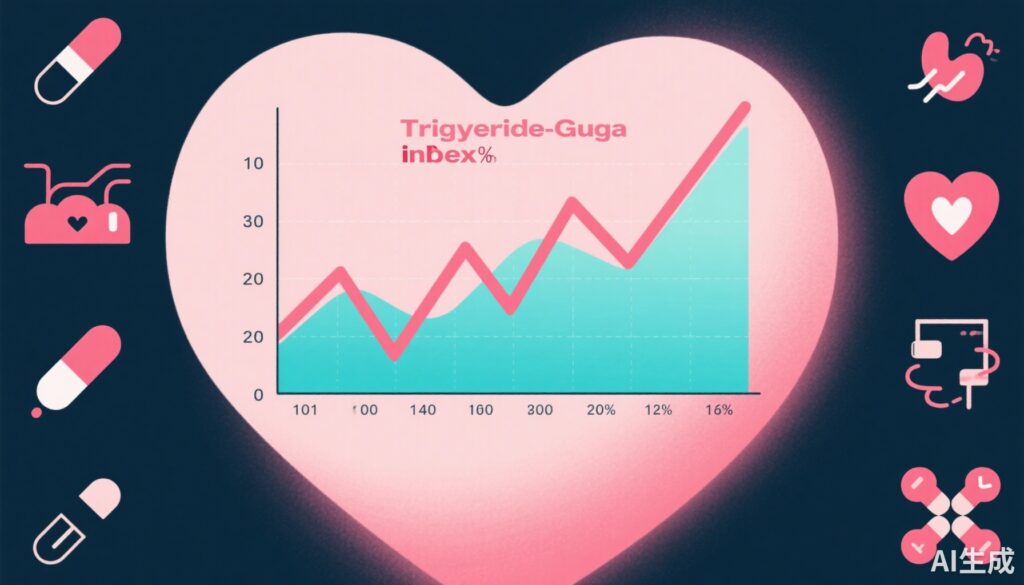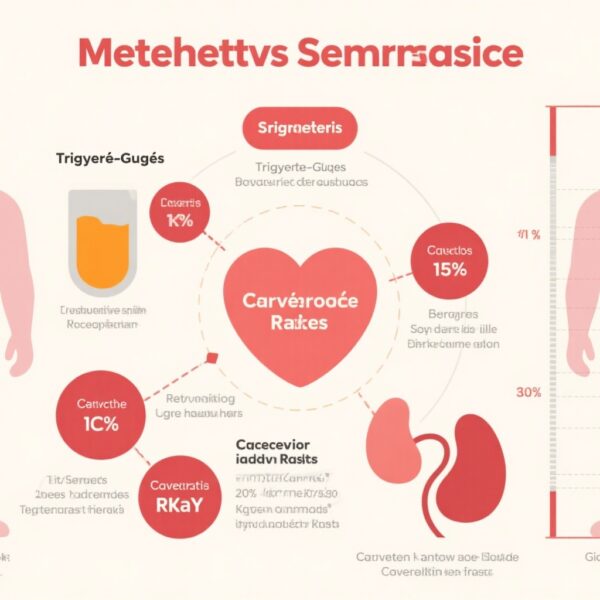Highlight
- Elevated triglyceride-glucose (TyG) index is associated with increased risk of major adverse cardiovascular events (MACEs) in patients with coronary heart disease (CHD), regardless of diabetes status.
- The TyG index predicts all-cause mortality, nonfatal myocardial infarction, and revascularization in both diabetic and nondiabetic CHD populations.
- Nonfatal stroke is significantly linked with TyG index only in diabetic CHD patients, not in those without diabetes.
- This study supports the TyG index as a potential prognostic marker in CHD but highlights the need for further prospective validation.
Background
Coronary heart disease (CHD) remains a leading cause of morbidity and mortality worldwide. Despite advances in management strategies, the risk of major adverse cardiovascular events (MACEs)—including myocardial infarction, stroke, and death—persists, especially in populations with comorbid metabolic disorders such as diabetes mellitus. Insulin resistance is a central pathophysiological mechanism linking diabetes and atherosclerosis, contributing to adverse cardiovascular outcomes. The triglyceride-glucose (TyG) index, calculated from fasting triglyceride and glucose levels, has emerged as a validated surrogate for insulin resistance. Prior studies have demonstrated associations between the TyG index and cardiovascular risk factors; however, whether the presence of diabetes modifies this relationship in CHD patients has remained unclear.
Study Design
This systematic review and meta-analysis synthesized data from 36 longitudinal cohort studies including 173,851 CHD patients, of whom 119,232 had diabetes and 54,619 did not. The databases searched included PubMed, Cochrane Library, Web of Science, and Embase from inception through March 13, 2025. The primary endpoint was MACEs, encompassing all-cause mortality, nonfatal myocardial infarction, nonfatal stroke, and revascularization procedures. Hazard ratios (HRs) and 95% confidence intervals (CIs) were extracted for analyses treating the TyG index as both categorical and continuous variables. Study quality was appraised using the Newcastle-Ottawa Scale. Statistical pooling was conducted using fixed-effect or random-effects models based on heterogeneity, with meta-regression and subgroup analyses to explore effect modifiers. This study was registered on PROSPERO (CRD: 420251018545).
Key Findings
In diabetic CHD patients, higher TyG index values were robustly associated with increased risks across all cardiovascular endpoints. Specifically, categorical analyses demonstrated nearly a twofold increased risk of MACEs (HR 1.98, 95% CI 1.61–2.43), alongside elevated risks for all-cause mortality (HR 1.74), nonfatal myocardial infarction (HR 2.05), nonfatal stroke (HR 1.73), and revascularization (HR 2.52).
Among nondiabetic CHD patients, elevated TyG index also predicted MACEs (categorical HR 1.65) and similarly increased risks of mortality (HR 1.50), nonfatal myocardial infarction (HR 2.46), and revascularization (HR 2.09). Notably, the association between the TyG index and nonfatal stroke in this group was not statistically significant (HR 1.66, 95% CI 0.88–3.12), suggesting possible differential mechanisms or risk profiles.
Continuous analyses of the TyG index reinforced these findings, indicating that incremental increases in the index correspond with proportionate increases in cardiovascular risk regardless of diabetes status.
Expert Commentary
This large-scale meta-analysis provides compelling evidence that the TyG index is an important prognostic biomarker in CHD. Its predictive capacity across diabetic and nondiabetic populations underscores the relevance of insulin resistance-related metabolic dysregulation in cardiovascular disease progression. The attenuation of the stroke association in nondiabetic patients raises intriguing mechanistic questions warranting further investigation.
The study’s rigorous methodology, including comprehensive literature search, large sample size, and use of meta-regression, strengthens confidence in the results. Nevertheless, substantial heterogeneity among studies and reliance on observational data limit causal inferences. The variability in TyG measurement thresholds and definitions across cohorts could also affect consistency.
Current guidelines have not yet incorporated the TyG index into cardiovascular risk stratification algorithms. These findings support the index’s potential utility as an accessible, cost-effective tool to identify high-risk patients who might benefit from intensified preventive strategies. Further prospective studies and clinical trials are needed to clarify clinical utility and integration into practice.
Conclusion
Elevated triglyceride-glucose index values are independently associated with a significantly increased risk of major adverse cardiovascular events, including all-cause mortality, myocardial infarction, and revascularization in patients with coronary heart disease, irrespective of diabetes status. However, the link between TyG index and nonfatal stroke appears confined to diabetic CHD patients. These results emphasize the TyG index’s potential as a valuable prognostic biomarker and reinforce insulin resistance as a key target to mitigate cardiovascular risk. Prospective studies are warranted to validate these findings, explore underlying mechanisms, and evaluate the efficacy of interventions targeting TyG reduction for cardiovascular event prevention.
Funding and ClinicalTrials.gov
No specific funding disclosure was reported. No clinical trial registration applies as this study is a meta-analysis.
References
Xu S, Zhang Z, Li J, Ding Y, Chen Y, Zhou Y, Hu S. Does diabetes status modify the association between the triglyceride-glucose index and major adverse cardiovascular events in patients with coronary heart disease? A systematic review and meta-analysis of longitudinal cohort studies. Cardiovasc Diabetol. 2025 Aug 4;24(1):317. doi: 10.1186/s12933-025-02890-7. PMID: 40760488; PMCID: PMC12323116.



